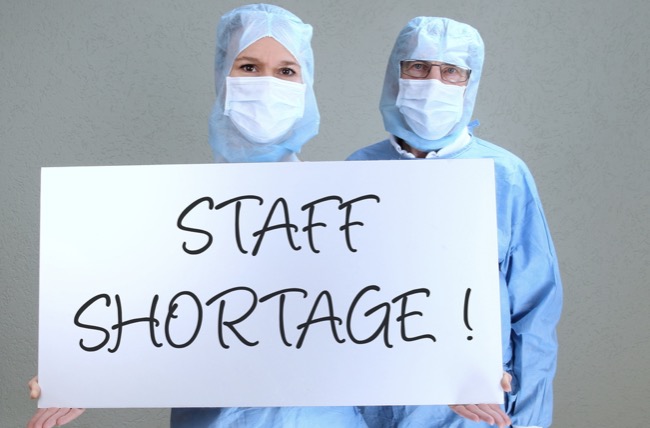The world of healthcare is constantly evolving. Medical science has taken great strides in the last several years, and things that once seemed like science fiction–like 3D printing human tissue–have become very real components of modern medicine. As the field continues to advance and evolve, though, it seems the only thing that has remained constant is the fact that things are always changing.
Each day, healthcare providers lace up their scrub shoes and go to work caring for patients in their times of need. Even though the exact treatments, protocols and available services have changed dramatically over the years, workers have always been there to treat patients with respect and ensure their health needs are met. Patients often struggle to understand the changes in healthcare and find it difficult to adjust to new protocols, but their doctors and other providers are there to guide them through and ensure they receive the care they need.
While your healthcare provider should be willing to answer your questions and address any concerns you may have, it’s still helpful to familiarize yourself with upcoming changes. Keep reading to discover a few anticipated changes to healthcare in 2021 and the future.
Story Stages
Growth of Team-Based Healthcare
The concept of multiple healthcare providers working together to achieve the best possible outcome for a patient certainly isn’t new. It is anticipated, though, that team-based healthcare will become the standard in the coming years. Providers are pushing for a formalized system that makes it easier for multiple people to collaborate when caring for a patient because doing so yields better results for the patient while enhancing physician well-being.
With team-based healthcare, doctors, caregivers and family members all work together toward the common goal of achieving the best outcome for the patient. With practices in the healthcare industry becoming increasingly specialized, this model makes it easier for patients to receive the best possible care for any issues they may have. Team-based healthcare also aims to unite various arms of the healthcare industry, resulting in a more refined process, lower costs and improved functionality.
Expansion of Telehealth

Source: Prostock-studio/Shutterstock.com
The COVID-19 pandemic has changed the face of healthcare in many ways. One of the most notable, however, is how it prompted the explosive growth of virtual healthcare services. While telehealth has been becoming increasingly available over the last decade or so, the pandemic has made the service more vital than ever before. In response, legislation has been passed to increase access to virtual healthcare services.
Over the next several years, telehealth is projected to expand exponentially. Though a great deal of legislation was initially passed to help mitigate the spread of COVID-19, telehealth services will remain available well into the future for similar reasons. Even in a post-pandemic world, allowing patients to receive medical attention–for the flu, for example–remotely rather than going to a doctor’s office significantly lowers the risk of illness transmission.
It has also become clear telehealth services make healthcare much more accessible to many people. It eliminates problems associated with not having the ability to travel to a doctor’s office or not having time for an appointment. Telehealth makes healthcare convenient and accessible, plus it lowers costs. For these reasons, it will likely become an even larger part of the industry in 2021 and beyond.
As the technology continues to grow, things like remote healthcare kits will become common household items. With these kits and apps, patients will be able to transmit vital data, including their blood pressure, weight, temperature, etc., directly to their provider safely and securely.
Greater Implementation of Lean Healthcare
Lean healthcare is expected to become increasingly prevalent in the coming years. In lean healthcare, providers and facilities implement so-called “lean” strategies to minimize waste in process and procedures. This is done to decrease operational costs and to improve patient experiences. Learn more about the current trends and approaches in lean healthcare to better understand how it may impact you.
Enhanced Sanitation and Disinfection Practices
Cleanliness has long been vital in hospitals, doctors’ offices and other facilities. In light of the COVID-19 pandemic, however, it has become more important than ever before. Throughout 2020, additional steps have been taken to prevent the spread of viruses and protect patients, and many of these changes will likely be permanent.
From washing scrubs and linens using antimicrobial laundry detergent to disinfecting every surface a patient touches, your healthcare providers are doing everything possible to ensure your safety. Keep in mind, though, many of these procedures take extra time, so you may find it takes a bit longer to get checked in at your doctor’s office. Be patient. No one enjoys making patients wait a few moments longer, but doing so can help mitigate the spread of infectious diseases and make healthcare facilities healthier for everyone.
Accelerated Job Growth

Source: riopatuca/Shutterstock.com
Between 2016 and 2026, the Bureau of Labor Statistics predicts the employment of healthcare occupations will expand by 18 percent. This rate of growth is significantly higher than the average. With the healthcare industry already facing doctor shortages, it will be necessary to implement new programs to ensure staffing needs are met. This could mean creating new educational opportunities and programs, providing greater subsidies for schooling, etc.
If you have ever considered a healthcare career, now could be a great time to get started. There will be a huge demand for doctors, nurses, aides, technicians, etc. over the next several years, and you may be able to take advantage of various incentives to make your education more accessible or affordable.
The Bottom Line
Healthcare is always changing, and it can be difficult to keep up. Changes that impact patient care are being made every day, so it is important to remain informed so you can have an idea of what to expect. If you have any questions or need help understanding an upcoming change, it is always best to consult with your healthcare provider.
